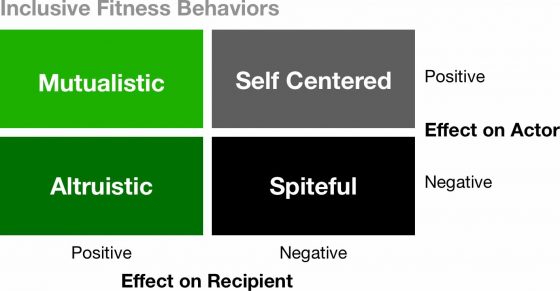The rise of mutual stakeholding

When it comes to understanding what humanity needs to thrive, it may help to understand what it (or any species) needs to survive.
Inclusive fitness, also referred to as kin selection or kinship, is defined as the success of an organism’s evolutionary survival based on mutualistic or altruistic behavior. However, this kinship is most successful through mutualism, benefitting multiple individuals at once, whereas altruism requires benefitting the ‘recipient’ at the expense of the ‘actor’. See diagram above, applied to human behavior.
Notice that while spiteful behavior clearly leads to extinction, altruistic and self-centered behavior may also lead to extinction given the potential zero sum gain of positive effects involving actor and recipient stakeholders. Only mutualistic behavior is assured a net positive effect to all stakeholders.
Thus, the success of our community or societal evolutionary survival largely depends on mutualistic behavior. This means developing kinship with fellow stakeholders – as strangers. How are we going to do this in an individualistic, self-help, self-centered culture where our deepest trust seldom extends beyond family? Through mutually aligned, beneficial, vested interests; ‘kin skin in the game’. Mutual stakeholding.
A foundation for the execution of mutual stakeholding is provided through the definition of ‘impact’, as presented in the book Real Impact: The New Economics of Social Change and its associated nonprofit, Transform Finance:
1) Projects are primarily designed, governed, and where feasible owned by communities.
2) Investments add more value than they extract.
3) The financial relationship fairly balances risks and returns among all stakeholders.
…where investments are inclusive (social, intellectual, financial); value is inclusive (individual, community, environmental); and all stakeholders are inclusive (individual, community, environmental).
What are the tools most aligned with mutual stakeholding?
Design thinking, open sourcing, inclusive stakeholding, open participatory organization, crowdsourcing, sensemaking, collective impact, community capital, crowdfunding, participatory budgeting, cooperatives and many more.
What are examples of mutual stakeholding?
Co-op businesses, utilities and buildings, cohousing, ESOPs (employee stock ownership plan), sovereign communities (Christiania, Plum Village)
What are prototypes representing the next generation of mutual stakeholding?
Burning Man, Nevada. Commongrounds Co-op, Michigan.

Leave a Reply